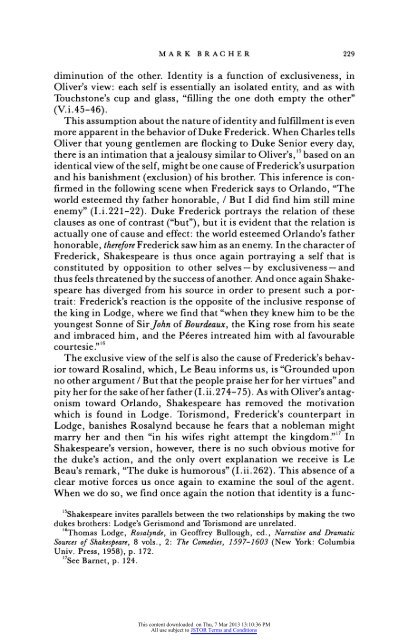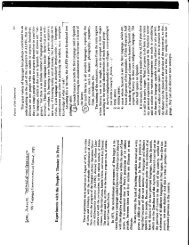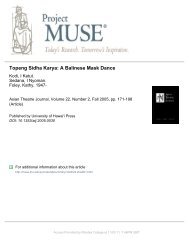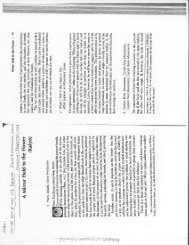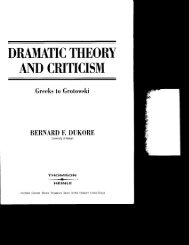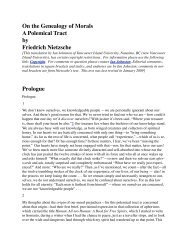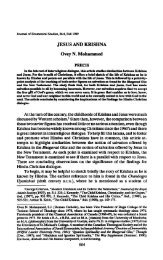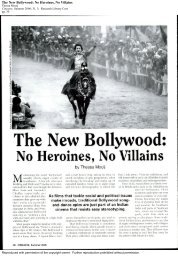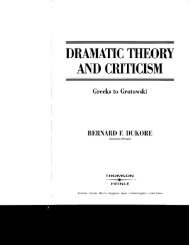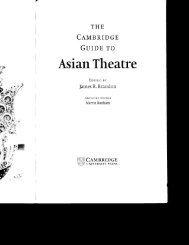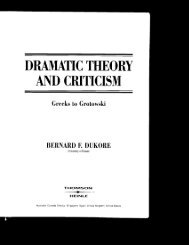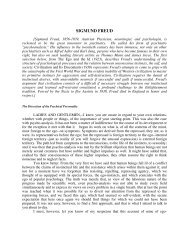Contrary Notions of Identity in As You like It - Yavanika
Contrary Notions of Identity in As You like It - Yavanika
Contrary Notions of Identity in As You like It - Yavanika
You also want an ePaper? Increase the reach of your titles
YUMPU automatically turns print PDFs into web optimized ePapers that Google loves.
MARK<br />
BRACHER<br />
229<br />
dim<strong>in</strong>ution <strong>of</strong> the other. <strong>Identity</strong> is a function <strong>of</strong> exclusiveness, <strong>in</strong><br />
Oliver's view: each self is essentially an isolated entity, and as with<br />
Touchstone's cup and glass, "fill<strong>in</strong>g the one doth empty the other"<br />
(V.i.45-46).<br />
This assumption about the nature <strong>of</strong> identity and fulfillment is even<br />
more apparent <strong>in</strong> the behavior <strong>of</strong> Duke Frederick. When Charles tells<br />
Oliver that young gentlemen are flock<strong>in</strong>g to Duke Senior every day,<br />
there is an <strong>in</strong>timation that ajealousy similar to Oliver's,15 based on an<br />
identical view <strong>of</strong> the self, might be one cause <strong>of</strong> Frederick's usurpation<br />
and his banishment (exclusion) <strong>of</strong> his brother. This <strong>in</strong>ference is confirmed<br />
<strong>in</strong> the follow<strong>in</strong>g scene when Frederick says to Orlando, "The<br />
world esteemed thy father honorable, / But I did f<strong>in</strong>d him still m<strong>in</strong>e<br />
enemy" (I.i.221-22). Duke Frederick portrays the relation <strong>of</strong> these<br />
clauses as one <strong>of</strong> contrast ("but"), but it is evident that the relation is<br />
actually one <strong>of</strong> cause and effect: the world esteemed Orlando's father<br />
honorable, therefore Frederick saw him as an enemy. In the character <strong>of</strong><br />
Frederick, Shakespeare is thus once aga<strong>in</strong> portray<strong>in</strong>g a self that is<br />
constituted by opposition to other selves-by exclusiveness-and<br />
thus feels threatened by the success <strong>of</strong> another. And once aga<strong>in</strong> Shakespeare<br />
has diverged from his source <strong>in</strong> order to present such a portrait:<br />
Frederick's reaction is the opposite <strong>of</strong> the <strong>in</strong>clusive response <strong>of</strong><br />
the k<strong>in</strong>g <strong>in</strong> Lodge, where we f<strong>in</strong>d that "when they knew him to be the<br />
youngest Sonne <strong>of</strong> Sir John <strong>of</strong> Bourdeaux, the K<strong>in</strong>g rose from his seate<br />
and imbraced him, and the Peeres <strong>in</strong>treated him with al favourable<br />
courtesie.:'6<br />
The exclusive view <strong>of</strong> the self is also the cause <strong>of</strong> Frederick's behavior<br />
toward Rosal<strong>in</strong>d, which, Le Beau <strong>in</strong>forms us, is "Grounded upon<br />
no other argument / But that the people praise her for her virtues" and<br />
pity her for the sake <strong>of</strong> her father (I.ii.274-75). <strong>As</strong> with Oliver's antagonism<br />
toward Orlando, Shakespeare has removed the motivation<br />
which is found <strong>in</strong> Lodge. Torismond, Frederick's counterpart <strong>in</strong><br />
Lodge, banishes Rosalynd because he fears that a nobleman might<br />
marry her and then "<strong>in</strong> his wifes right attempt the k<strong>in</strong>gdom."'7 In<br />
Shakespeare's version, however, there is no such obvious motive for<br />
the duke's action, and the only overt explanation we receive is Le<br />
Beau's remark, "The duke is humorous" (I.ii.262). This absence <strong>of</strong> a<br />
clear motive forces us once aga<strong>in</strong> to exam<strong>in</strong>e the soul <strong>of</strong> the agent.<br />
When we do so, we f<strong>in</strong>d once aga<strong>in</strong> the notion that identity is a func-<br />
'5Shakespeare <strong>in</strong>vites parallels between the two relationships by mak<strong>in</strong>g the two<br />
dukes brothers: Lodge's Gerismond and Torismond are unrelated.<br />
'6Thomas Lodge, Rosalynde, <strong>in</strong> Ge<strong>of</strong>frey Bullough, ed., Narrative and Dramatic<br />
Sources <strong>of</strong> Shakespeare, 8 vols., 2: The Comedies, 1597-1603 (New York: Columbia<br />
Univ. Press, 1958), p. 172.<br />
'7See Barnet, p. 124.<br />
This content downloaded on Thu, 7 Mar 2013 13:10:36 PM<br />
All use subject to JSTOR Terms and Conditions


